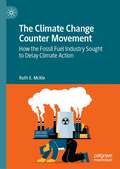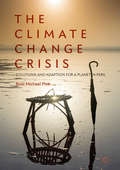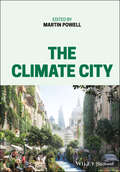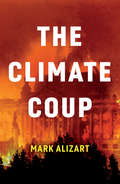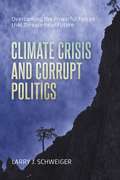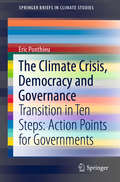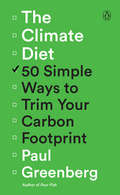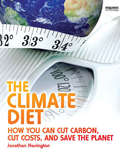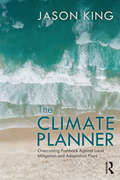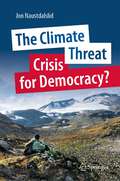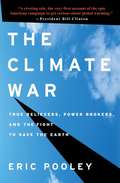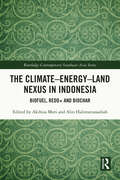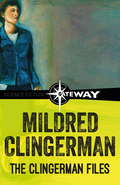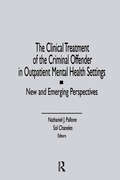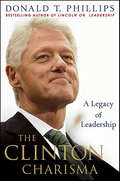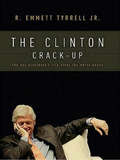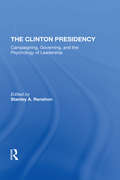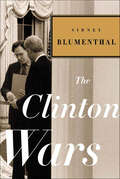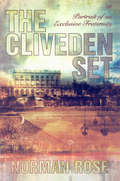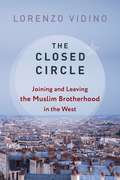- Table View
- List View
The Climate Change Counter Movement: How the Fossil Fuel Industry Sought to Delay Climate Action
by Ruth E. McKieThis book provides an historical account of the emergence and spread of the climate change counter movement across the globe. Drawing on an extensive database developed by the author, the book recounts the development of an international network, taking the reader on a journey through the history of the movement before looking closely at a series of comparative case studies examining movement organisations in different countries.
The Climate Change Crisis: Solutions And Adaption For A Planet In Peril
by Ross Michael PinkThis book explores how the world community will respond to the unfolding humanitarian crisis caused by climate change. It recognises climate change as the greatest threat to human development in the 21st century, bringing with it: flooding, drought, extreme temperatures, health crises, threats to human security and severe harm to economic development.The Climate Change Crisis addresses climate change and its impact as a major threat for countries around the world. Through a collection of interviews with leading environmentalists and exploration into new innovations that can offer hope and protection for billions of people, this book presents an interdisciplinary approach towards understanding the paramount health and development challenges of climate change.This timely and informative book cuts across several disciplines, including human rights, public policy, international relations, national refugee policy, and migration studies.
The Climate City
by Martin PowellTHE CLIMATE CITY Provides professionals in finance, technology, and consulting with solutions for improving the quality of urban life under the changing climate The Climate City provides cutting-edge approaches for developing resilient solutions to combat the effects of climate change in cities throughout the world. Linking finance and technology to policy and innovation, this highly practical resource outlines a global framework for mitigating and adapting to climate change and for effectively planning and delivering a low-carbon future. This book addresses how cities can work effectively with each other to drive change, the importance of strong leadership and international cooperation, the role of innovative finance and technology to identify new economic opportunities, and more. Throughout the book, the authors address future trends such as the changing streetscape, connected infrastructure and eMobility, and autonomous vehicles, drones, and other emerging technologies. Designed to help all stakeholders build a pathway to a less resource-intensive future, The Climate City: Provides in-depth discussion of the technological, financial, and practical aspects of tackling climate change in urban environments Demonstrates why the global economy needs to transition to a low-carbon economy Describes the role of financial institutions and how they can allocate capital more efficiently Explains why and how challenges and priorities are different in the global north and south Illustrates how data can improve the ways cities use energy resources and operate transportation systems Discusses how citizen action can drive a new, more meaningful way of living in cities Features insights from political leaders such as the Mayor of Copenhagen, the Mayor of Los Angeles and the former Mayor of London and Prime Minister of the United Kingdom The Climate City is essential reading for city planners, policy makers, technologists, consultants, finance and business professionals, and general readers wanting to improve the cities in which they work and live.
The Climate Coup
by Mark AlizartInaction by governments in the face of climate change is often attributed to a lack of political will or a denial of the seriousness of the situation, but as Mark Alizart argues in this provocative book, we shouldn’t exclude the possibility that part of the reluctance might be motivated by cynicism and even sheer evil: for some people, there are real financial and political benefits to be gained from the chaos that will ensue from environmental disaster. The climate crisis creates its winners – individuals who orchestrate environmental chaos and bet on the collapse of the world as they bet on declining share values. In the face of this veritable ‘carbofascist’ coup targeting humanity, modifying our behaviour as individuals won’t suffice. We must train our critical attention on those financial and political actors who speculate on catastrophe and, in the light of this, we must rethink the strategy of ecological activism. This is a war to win, not a crisis to overcome.
The Climate Crisis and Corrupt Politics: Overcoming the Powerful Forces that Threaten our Future
by Larry J SchweigerThere is only one earth and our world is undergoing dramatic changes brought on by the climate crisis and other human-induced ecological disruptions. The world's top scientists studying these threats and the forces behind them have been warning us for dec
The Climate Crisis, Democracy and Governance: Transition in Ten Steps: Action Points for Governments (SpringerBriefs in Climate Studies)
by Eric PonthieuThis book argues that at a time when the world is facing environmental and social upheaval, the political establishment has been unwilling to listen and slow to act. This is reflected in a political system that has been incapable of rising to the challenge. Only by governments taking a radical and progressive lead in making changes – imposing them if necessary – can there be any hope of slowing, stopping and then reversing our global catastrophe. Governments hold the prime responsibility in the creation of a virtuous circle of positive action for the climate. Starting from a European perspective, a ten point manifesto explains how this can be done and how we can have hope for the future. The book is a call for action to European governments in the approach to COP26 and when plans for a European Green Deal are being discussed in the EU.Disclaimer: The author of this publication is acting in his own name. The viewpoints he defends are in no way reflecting the opinion of the European Economic and Social Committee and of other EU institutions.
The Climate Diet: 50 Simple Ways to Trim Your Carbon Footprint
by Paul GreenbergA celebrated writer on food and sustainability offers fifty straightforward, impactful rules for climate-friendly living"Some strong and rational suggestions for reducing your personal impact here--and when you're eating smart, you'll have the energy to do the movement building we need to change systems too! This book integrates the individual and the societal in a powerful way."--Bill McKibbenWe all understand just how dire the circumstances facing our planet are and that we all need to do our part to stem the tide of climate change. When we look in the mirror, we can admit that we desperately need to go on a climate diet. But the task of cutting down our carbon emissions feels overwhelming and the discipline required hard to summon. With The Climate Diet, award-winning food and environmental writer Paul Greenberg offers us the practical, accessible guide we all need. It contains fifty achievable steps we can take to live our daily lives in a way that's friendlier to the planet--from what we eat, how we live at home, how we travel, and how we lobby businesses and elected officials to do the right thing. Chock-full of simple yet revelatory guidance, The Climate Diet empowers us to cast aside feelings of helplessness and start making positive changes for the good of our planet.
The Climate Diet: How You Can Cut Carbon, Cut Costs, and Save the Planet
by Jonathan HarringtonThe atmosphere is getting fat on our carbon and other greenhouse gas emissions and it needs our help. We live in a world of excess, consuming too much of everything-food, clothes, cars, toys, shoes, bricks, and mortar. Our bingeing is often so extreme that it threatens our own health and wellbeing. And we are not the only ones who are getting sick. The Earth, which provides the food, air, water, and land that sustains us, is also under severe pressure. We either take steps to put our personal and planetary systems back into balance or we suffer the consequences. So, what does any unhealthy overweight person do when the doctor tells him or her that they are eating themselves into an early grave? Go on a diet! This is the must-have guide to the most important diet ever, explaining climate change concepts, problems, and solutions in ways that anyone can easily understand. Following a six-step climate diet plan, families will be able to count their carbon calories and learn how to reduce them, leaving us with a slim healthy planet now and for the future.
The Climate Planner: Overcoming Pushback Against Local Mitigation and Adaptation Plans
by Jason KingThe Climate Planner is about overcoming the objections to climate change mitigation and adaption that urban planners face at a local level. It shows how to draft climate plans that encounter less resistance because they involve the public, stakeholders, and decisionmakers in a way that builds trust, creates consensus, and leads to implementation. Although focused on the local level, this book discusses climate basics such as carbon dioxide levels in the atmosphere, the Intergovernmental Panel on Climate Change, the Paris Agreement of 2015, worldwide energy generation forecasts, and other items of global concern in order to familiarize urban planners and citizen planners with key concepts that they will need to know in order to be able to host climate conversations at the local level. The many case studies from around the United States of America show how communities have encountered pushback and bridged the implementation gap, the gap between plan and reality, thanks to a commitment to substantive public engagement. The book is written for urban planners, local activists, journalists, elected or appointed representatives, and the average citizen worried about climate breakdown and interested in working to reshape the built environment.
The Climate Threat. Crisis for Democracy?
by Jon NaustdalslidA key point in the book is the need to focus more seriously at the energy problem as the real problem behind global warming. The failure of global climate policies to reduce CO2 emissions and halt climate change has led an increasing number of scientist and activists to lose confidence in democracy's ability to handle climate change and led them to look to more authoritarian measures to meet the problem. The book documents these trends, also from a historical perspective, criticize them and sketches more democratic alternatives.
The Climate War: True Believers, Power Brokers, and the Fight to Save the Earth
by Eric PooleyIn The Climate War, Eric Pooley--deputy editor of Bloomberg BusinessWeek--does for global warming what Bob Woodward did for presidents and Lawrence Wright did for terrorists. In this epic tale of an American civil war, Pooley takes us behind the scenes and into the hearts and minds of the most important players in the struggle to cap global warming pollution--a fight in which trillions of dollars and the fate of the planet are at stake. Why has it been so hard for America to come to grips with climate change? Why do so many people believe it isn't really happening? As President Obama's science advisor John Holdren has said, "We're driving in a car with bad brakes in a fog and heading for a cliff. We know for sure that cliff is out there. We just don't know exactly where it is. Prudence would suggest that we should start putting on the brakes." But powerful interests are threatened by the carbon cap that would speed the transition to a clean energy economy, and their agents have worked successfully to deny the problem and delay the solutions. To write this book, Pooley, the former managing editor of Fortune and chief political correspondent for Time, spent three years embedded with an extraordinary cast of characters: from the flamboyant head of one of the nation's largest coal-burning energy companies to the driven environmental leader who made common cause with him, from leading scientists warning of impending catastrophe to professional skeptics disputing almost every aspect of climate science, from radical activists chaining themselves to bulldozers to powerful lobbyists, media gurus, and advisors in Obama's West Wing--and, to top it off, unprecedented access to former Vice President Al Gore and his team of climate activists. Pooley captures the quiet determination and even heroism of climate campaigners who have dedicated their lives to an uphill battle that's still raging today. He asks whether we have what it takes to preserve our planet's habitability, and shows how America's climate war sends shock waves from Bali to Copenhagen. No other reporter enjoys such access to this cast of characters. No other book covers this terrain. From the trenches of a North Carolina power plant to the battlefields of Capitol Hill, Madison Avenue, and Wall Street, The Climate War is the essential read for anyone who wants to understand the players and politics behind the most important issue we face today.
The Climate–Energy–Land Nexus in Indonesia: Biofuel, REDD+ and biochar (Routledge Contemporary Southeast Asia Series)
by Akihisa Mori Alin HalimatussadiahThis book extends the framework of the climate-energy-land nexus to elucidate political, economic, social, and institutional factors and causal mechanisms that stringent climate targets bring about, rather than mitigate a disproportional heavy burden on the forest sector in Indonesia. Assessing climate, energy, agricultural, forest, and transmigration policies, and REDD+ and biochar solutions through a multidisciplinary approach, ranging from biological, agricultural, technological, economic, and institutional lenses, the book identifies the political-economic and socio-technical regimes that cause the crosssectoral transfer of responsibility for greenhouse gas emissions to palm-oil-based biofuel, imposing an excess burden on the forest sector and accelerating indirect land-use change. It also proposes possible countermeasures for agricultural and forest sectors, reconfirming that technical applications and integrated policymaking should trigger the socioeconomic changes that will make transformative change happen in Indonesia. As an analysis of the success, or otherwise, of stringent climate targets, policies, and technological and non-technological measures on the reduction of greenhouse gases, this book will be of great interest to students and scholars in the fields of environment & sustainability, Asian studies, energy, environment and agriculture, forestry, and agriculture & environmental sciences. It will also appeal to practitioners and policymakers tackling net-zero emissions and land and forest governance.
The Clingerman Files
by Mildred ClingermanWidely acclaimed as one of the first successful female science fiction authors, Mildred Clingerman returns with the exciting follow up to her 1961 science fiction collection, A Cupful of Space. Her stories tend to wed a literate tone to subject matters whose ominousness is perhaps more submerged than the horrors under the skin made explicit in the work of Shirley Jackson, but equally as deadly. Clingerman's new anthology, The Clingerman Files, includes all of her originally published stories; The Day of the Green Velvet Cloak, Mr. Sakrison's Halt, Wild Wood, The Little Witch of Elm Street and many other favourites. Also included are previously unpublished works; Top Hand, Tribal Customs, The Birthday Party, Fathers of Daughters and many more soon to be favourites. The key to her stories is that they appear simple and straightforward, but each takes a twist or turn that, even when you're tempted to guess where they're heading, they take you there in a way you would never have bargained on. Other writers of the period tried to make big splashes. Clingerman, it seems, prided herself in concealing her effects within her masterfully constructed sentences. They barely make a ripple on the surface; all their power and drive lurk deep down below. So many of her stories are alive with the underpinning notion that the cosmological vistas we spy at the end ends of telescopes and various other means of measurement belong to the very same universe under our feet. We're not apart from the universe, we're a part of it. Nearly every story here is alive with that sensibility, in the truest sense of that word. In every sentence there is a note (a gentle one, but insistent) of silent rebellion, a surreptitious snarl, entreating you to see that not the everyday, but an undiscovered marvel. May these eloquent rebellions be undiscovered no longer.
The Clinical Treatment of the Criminal Offender in Outpatient Mental Health Settings: New and Emerging Perspectives
by Letitia C PalloneThis volume brings together in a single source a set of perspectives by leaders in the clinical treatment of criminal offenders in outpatient settings, particularly those whose crimes have involved domestic violence and/or substance abuse. More than a set of “how to” techniques, it addresses the question of which offenders can successfully be treated in what settings by which techniques. It is a valuable resource not only for those concerned with prisons, probation, and parole, but also for those responsible for the delivery of mental health services in the community.
The Clinton Charisma: A Legacy of Leadership
by Donald T. PhillipsIt is often overlooked, but Bill Clinton assumed the presidency in one of the most difficult times in our nation's history. The country was in a deep recession, the end of the Cold War had created new threats to our national security, and our health care system was in shambles. The country has now come full circle. Leadership has been replaced with self-interest, cronyism, and fear. More than ever, Bill Clinton's candor and success in adversity warrant revisiting during this age of a closed-door administration and governmental incompetence. The Clinton Charisma is a fascinating, prescriptive guide that reveals the former president's complex leadership techniques, including his attention to public opinion, his ability to take quick corrective action, and his efficient damage control in the face of political and personal difficulty. From diversity to decisiveness, from consensus to compromise, each chapter explores how Clinton employed important leadership principles and the ways in which they were--or were not--effective.The author asks in the introduction, "Are there lessons to be learned from his time in office--from his damage control strategies, from his ability to implement diversity, or from his decision-making process?"The answer, as Donald T. Phillips's The Clinton Charisma makes compellingly clear, is yes.
The Clinton Crack-Up
by Emmett TyrrellWith his characteristic investigative eye and Menckenesque prose, R. Emmett Tyrrell Jr. sheds new light on Bill Clinton's post-presidential emotional depression, globe trotting and international deal-making, financial ties to China and the United Arab Emirates, ongoing womanizing, vital support role in Hillary Clinton's anticipated run for the White House, and possible role as America's first "First Man."
The Clinton Enigma: A Four and a Half Minute Speech Reveals This President's Entire Life
by David Maraniss Edith FowlerPulitzer Prize-winning journalist David Maraniss, regarded by his peers as the nation's leading expert on Bill Clinton, sat in a darkened television studio in New York on the night of August 17 and watched the president deliver his curious apologia confessing that he had misled the nation about his relationship with Monica Lewinsky. As Maraniss, the author of First in His Class, the highly acclaimed Clinton biography, listened to the president's words that night, it struck him that he had heard them all before, though never in one speech, and that in those four and a half minutes Clinton had revealed all the contradictory qualities of his tumultuous life and political career. In this insightful new book, drawing from the biography and his writings for The Washington Post, Maraniss dissects the speech as a revelation of the president's entire life. Alternately reckless and cautious, righteous and repentant, evasive and forgetful, relying on family and friends to protect him, affirming his faith in God and then turning to polls to tell him what the public would tolerate, communicating with the public over the heads of pundits and professionals, transforming his personal trauma into a political cause by attacking his and his wife's enemies, asking us all to put his troubles behind us, Clinton combined all his weaknesses and strengths in that one brief address. In the first section of The Clinton Enigma, Maraniss reflects as a biographer on his curious but revealing dealings with Clinton over the years. Then, after Clinton has spoken, Maraniss dissects the words and interprets the deeper meaning paragraph by paragraph, to show the roots and echoes from the president's past and to explain why Clinton acts and speaks as he does. With Bill Clinton, Maraniss writes, past is always prologue.
The Clinton Presidency: Campaigning, Governing, And The Psychology Of Leadership
by Stanley RenshonThe Clinton presidency faced a basic set of public questions at the outset regarding its real intentions, strategies, and competence. Would the administration be able to develop and implement policies that were constructive in intent, fair in formulation, and successful in result? Would President Clinton be able to govern as successfully as he campaigned? Would there be a productive fit between Clinton's leadership style and the needs of the public? Additional questions arise about Clinton personally. Many admire him; others distrust him. What realistic basis is there for either view? This book explores these questions and develops an initial appraisal of the Clinton presidency. The chapters herein are framed by theories of political leadership and psychology. They draw on a diverse body of theories, including psychological theories of character and personality, cognitive psychology and communication theory, theories of presidential leadership and performance, and theories of public psychology. The goal is to examine the many facets of leadership and governing that constitute the modern presidency and to locate Bill Clinton's emerging presidency within that framework. Bill Clinton is and likely will remain a controversial president. One objective of this analysis is to provide a clearer, more objective framework in which to evaluate both the man and his approach to political leadership and executive power and the consequences of his approach for public psychology and policy.
The Clinton Tapes: Wrestling History with the President
by Taylor BranchTaylor Branch’s groundbreaking book about the modern presidency, The Clinton Tapes, invites readers into private dialogue with a gifted, tormented, resilient president. Here is what President Clinton thought and felt but could not say in public.This book rests upon a secret project, initiated by Clinton, to preserve for future historians an unfiltered record of presidential experience. During his eight years in office, between 1993 and 2001, Clinton answered questions and told stories in the White House, usually late at night. His friend Pulitzer Prize-winning author Taylor Branch recorded seventy-nine of these dialogues to compile a trove of raw information about a presidency as it happened. Clinton drew upon the diary transcripts for his memoir in 2004. Branch recorded his own detailed recollections immediately after each session, covering not only the subjects discussed but also the look and feel of each evening with the president. The text engages Clinton from many angles. Readers hear candid stories, feel buffeting pressures, and weigh vivid descriptions of the White House settings. Branch's firsthand narrative is confessional, unsparing, and personal. The author admits straying at times from his primary role -- to collect raw material for future historians -- because his discussions with Clinton were unpredictable and intense. What should an objective prompter say when the President of the United States seeks advice, argues facts, or lodges complaints against the press? The dynamic relationship that emerges from these interviews is both affectionate and charged, with flashes of anger and humor. President Clinton drives the history, but this story is also about friends. The Clinton Tapes highlights major events of Clinton's two terms, including wars in Bosnia and Kosovo, the failure of health care reform, peace initiatives on three continents, the anti-deficit crusade, and titanic political struggles from Whitewater to American history's second presidential impeachment trial. Along the way, Clinton delivers colorful portraits of countless political figures and world leaders from Nelson Mandela to Pope John Paul II. These unprecedented White House dialogues will become a staple of presidential scholarship. Branch's masterly account opens a new window on a controversial era and Bill Clinton's eventual place among our chief executives.
The Clinton Wars
by Sidney BlumenthalAn invaluable history of an extraordinary presidency, and the chronicle of a generation's political odyssey When in 1997 Bill Clinton appointed Sidney Blumenthal as a senior advisor, the former writer was catapulted into the front lines of the Clinton wars. From his first day in the White House until long after his appearance as the only presidential aide ever to testify in an impeachment trial, Blumenthal acted in or witnessed nearly all the battles of the Clinton years. This major book—part history, part memoir—is the first inside account we have of the presidency of William Jefferson Clinton.The Clinton Wars begins in 1987, when Blumenthal first met Bill and Hillary Clinton. His chronicle of Clinton's first presidential campaign and first term draws on his experiences as confidant to both the President and the First Lady, and is enriched with previously unpublished revelations about both. This remarkable personal interpretation goes far in explaining the polarizing nature of Clinton's presence on the national scene. The narrative of Clinton's second term is even more dramatic. Blumenthal takes special note of the battle that was waged within the media between the President's detractors and defenders, which he expands into a vivid picture of Washington society torn apart by warring factions. But he does not neglect the wars fought on other fronts—in Kosovo, against Congress, and for economic prosperity. His remarkable book ends with the inside story of the fight to elect Al Gore in 2000 and extend the legacy of the Clinton-Gore Administration.Every page of this unrivaled, authoritative book, with its intimate insights into Clinton's personality and politics, attests to Blumenthal's literary skill, profound understanding of politics, and unique perspective on crucial events of our recent past. The Clinton Wars is a lasting contribution to American history.
The Clinton Years (Presidential Profiles)
by Shirley Anne WarshawBiographical dictionary of those important to government during the Clinton Presidency.
The Clintons' Anti-working-class Record: Why Washington Fears Working People
by Jack BarnesFor the first time in decades, the US rulers have begun to fear the working class. That, above all, is what the 2016 US election revealed. Why the fear? Because millions of working people are starting to reject being made to bear the brunt of capitalism's global economic and social crisis and brutal wars. Hillary Clinton contemptuously called workers who refused to vote for her irredeemable "deplorables." Winner Donald Trump tries to divide and weaken us-- demagogically targeting Mexicans, Muslims, unionists, women, and others--while lining the bosses' pockets. The Clintons' Anti-Working-Class Record documents the profit-driven course over the last quarter century of the party of capital, Democrat and Republican alike. It explains the awakening anger, the expanding and wide-ranging discussion among working people seeking to understand and effectively resist the capitalists' assaults. Jack Barnes is National Secretary of the Socialist Workers Party "It should be noted that The Clintons' Anti-Working-Class Record is emphatically not a pro-Republican or pro-Trump manifesto; the focus is on the Clintons' culpability in a status quo of immiseration for the working class. Chapters especially focus on the negative ramifications of "Ending Welfare As We Know It" in the early 2000's, and the root causes of the 2008 world financial crisis that became the Great Recession of 2009. A handful of black-and-white diagrams and an index round out this fierce, no-holds-barred condemnation of the Clintons' failings. Also highly recommended is Barnes' Are They Rich Because They're Smart? an open call for socialist revolution in the United States." --Midwest Book Review. For complete review click here.
The Clintons' War on Women
by Robert Morrow Roger Stone"This book on Hillary - really tough." - President Donald TrumpHillary Clinton is running for president as an "advocate of women and girls,” but there is another shocking side to her story that has been carefully covered up-until now. This stunning exposé reveals for the first time how Bill and Hillary Clinton systematically abused women and others-sexually, physically, and psychologically-in their scramble for power and wealth.In this groundbreaking book, New York Times bestselling author Roger Stone and researcher and alternative historian Robert Morrow map the arc of Bill and Hillary’s crimes and cover-ups. They reveal details about their actions in Arkansas, during Bill Clinton’s time in the White House, about who really ordered the deadly attack on the Branch Davidian compound in Waco, during Hillary’s tenure as secretary of state, about their time at the Clinton Foundation, and during Hillary’s current campaign for president.This is the first book to shed light on the couple’s deeply personal violations of the people they crushed in their obsessive quest for power. Along the way, Stone and Morrow reveal the family’s darkest secrets, including a Clinton family member’s drug rehab treatment that was never reported by the press, Hillary Clinton’s unusually close relationship with a top female aide, and a stunning revelation of such impact that it could strip Bill Clinton of his current popularity and derail Hillary’s push to be the second Clinton in the White House.Anyone who cares about the future of the United States will want to read this tell-all, exposing the appalling, unvarnished, and ugly truth about the Clintons. This paperback edition includes a new preface from Roger Stone, revealing explosive new information he’s learned since the hardcover’s release.
The Cliveden Set
by Norman RoseLloyd George once spoke of 'a very powerful combination - in its way the most powerful in the country'. Its proceedings were invariably conducted at Cliveden, the country estate of the fabulously wealthy Nancy and Waldorf Astor. Collectively dubbed 'God's Truth Ltd', the group included leading politicians, academics, writers and newspaper editors. Its pedigree impeccable, its social standing beyond reproach, its persuasive powers permeated the clubs and institutions of London, the senior common rooms of Oxbridge colleges, the quality press and the great country houses of England. Suddenly, in the late 1930s, the 'Cliveden Set' was catapulted into uncalled-for notoriety. It had been identified as a cabal that sought to manipulate, even determine, British foreign policy in order to uphold its narrow class interests. It would use any means, however devious - even negotiate a humiliating, dishonourable settlement with Nazi Germany - to maintain its privileges, those of a decaying ruling class. But was the 'Cliveden Set' a traitorous cabal, challenging 'the constitutional structures of British democracy', or simply an unstructured think-tank of harmless do-gooders? Norman Rose discerningly probes this fascinating tale, brilliantly disentangling fact from fiction, and setting this privileged clique in the wider perspective of its times.
The Closed Circle: Joining and Leaving the Muslim Brotherhood in the West (Columbia Studies in Terrorism and Irregular Warfare)
by Lorenzo VidinoThe Muslim Brotherhood in the West remains a mysterious entity. In The Closed Circle, Lorenzo Vidino offers an unprecedented inside view into how one of the world’s most influential Islamist groups operates. He marshals unique interviews with prominent former members and associates from Europe, the United Kingdom, and North America, shedding light on why and how people join and leave Western outfits of the Muslim Brotherhood.Drawing on these striking personal accounts, Vidino weaves together the experiences of individuals who participated in and later renounced Brotherhood groups. Their perspectives provide a wealth of new information about the Brotherhood’s secretive inner workings and the networks that connecting the small yet highly organized cluster of Brotherhood-influenced groups. The Closed Circle examines the tactics the Brotherhood uses to recruit and retain participants as well as how and why individuals make the difficult decision to leave. Through the stories of diverse former members, Vidino paints a portrait of a highly structured, tight-knit movement. His unprecedented access and understanding of the group’s activities and motivations has significant policy implications concerning Western Brotherhood organizations and also illuminates the underlying mechanisms found in a range of extremist groups.
